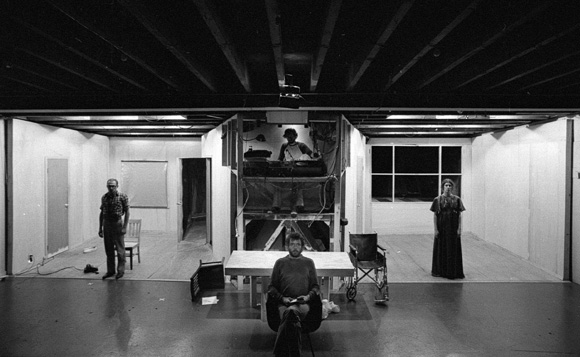Memory can be harsh. Everyone forgets the inconsequential, but we also forget some of the most painful memories we have. Some things are so emotionally wrought, you just can’t hold onto them. Other times, you can’t let them go and they obsess you.
All of this is explored in Elizabeth LeCompte & Ken Kobland’s reassembled video documentation of The Wooster Group’s 1977 production Rumstick Road by Spalding Gray and Elizabeth LeCompte, shown last week at Anthology Film Archives. Built on taped interviews Gray conducted in his mid-twenties with his grandmothers and father on the subject of his mother Betty’s suicide in 1967, the play now seems especially morbid and ethereal. In 2004, Gray drowned, a suspected suicide after his long battles with depression.
The stage design itself reiterates the themes of the production. The set’s opposing doors are mirrored, and open to a closed structure with only a radio tower upfront. As a permanent fixture on stage, it both divides the space, and serves as a constant reminder that identity is projected. Characters constantly run in and out of the darkened room, their image reflected on the doors and the space a metaphor for the mind and shifting memory.
Throughout the reconstruction we’re presented with fleeting or incomplete images. When Ron Vawter introduces the play, as Spalding Gray, his head is blackened while the rest of his body remains lit. A minute later, we see another Spalding, this time from a radio tower, tell three different versions of a story about how Rumstick Road, the road he grew up on, got its name. Only one version makes sense—the Indians sold the land for a barrel rum they tasted by dipping a stick in the barrel—but like Betty’s suicide (and even the reconstructed video), much has been lost to history.
The mind works in strange ways. At one point, Gray’s father tells him that he doesn’t like remembering terrible things or having them recorded, and his own memories reflect that. They are often imperfect and even distorted. “Your mother was a perfectly normal person,” he tells Gray. But having already heard his grandmother’s recollections, that version of the story is impossible to believe. “There’s no question in my mind she was suffering,” we hear her tell Gray, while Betty, on another half of the stage, whips her torso up and down in madness. “I can remember now her saying….Gram, what is the matter with me? Why do I feel this way? What can you do for me?”
We see Betty continue to hurl her body, at times grabbing onto the Gray family house projected behind her, just so she can more forcefully hurt herself. It’s torturous to watch and it goes on for more than ten minutes; by the end of that scene I found myself in tears, not for anything that had been said, but in sheer empathy for his mother’s despair.
That kind of despair must have hurt the family—the recordings frequently document frustrated relatives asking why anyone “would do that”. Gray himself, never poses this question, and in light of his own death, that absence doesn’t seem like it’s merely a literary device.
Despair also turns into betrayal. His father, for example, has no memory that Gray stopped talking when their dog Jill was put down, or that his mother had out of body experiences. He never acknowledges that either account ever happened. Gray, himself, isn’t entirely innocent of betrayal either, though arguably the act served a better good. Early on in the play, he decides to make public a bit of knowledge his grandmother told him to keep for himself:
There is no life, truth, intelligence, nor substance in matter. All is infinite mind and its infinite manifestation. God is all in all. Spirit is immortal truth. Matter is mortal error. Spirit is the real and eternal. Matter is the unreal and temporal. Spirit is God is his image and likeness; therefore man is not material, he is spiritual.
As an audience member you feel privileged to have this information, despite the betrayal, as it seems to underscore the legitimacy of his mother’s out of body experiences. The words may have also reflected Betty’s own feelings, who was so devout a Christian Scientist, it was believed to be a driving part of her illness. That part of the story everyone agrees on.
The rest of the accounts, by Gray and sometimes his Grandmothers, are challenged by his father. Suddenly, though, that all changes. Despite his discomfort with his son’s interviews, at the end the play Gray tells the audience he received a letter from his dad—written when his mother was ill, but left unsent until now. “Dear Spud, Mother is not doing well at all,” he begins. “I had high hopes she would get better, but I think she is getting worse. I phoned her twice a week, but there was very little to say and I always seem to upset her.”
We learn that his father worried she was insane, despite his earlier claims, and that she might not recover. He was right, but that seems besides the point. If there’s a moral to this movie, which itself is a reconstruction of a memory, it’s that we’re better served by the memories we choose to live with than those we forget.



Comments on this entry are closed.